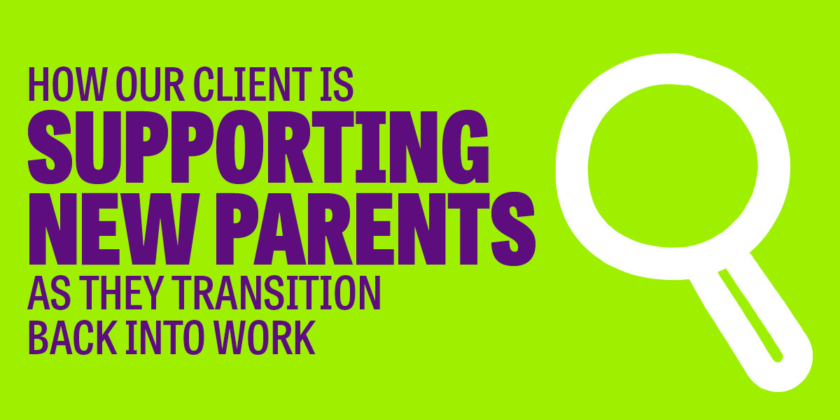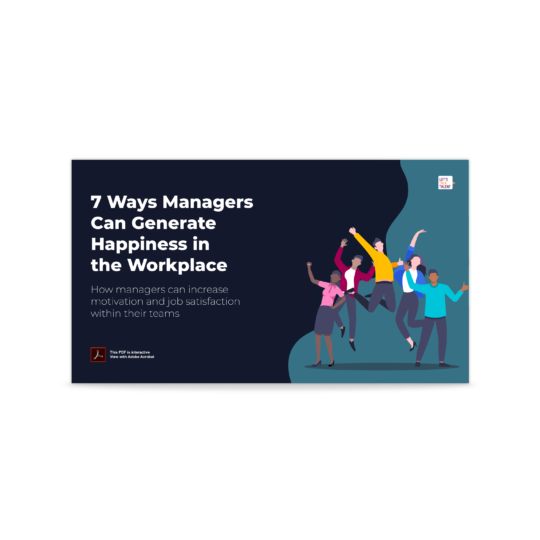Empowering employees on their parental journey
We know that performance isn’t linear. Employees are humans and, during their time with you, they are likely to go through several periods of change, including returning to work. Absences from work due to parental or sickness leave, bereavement, or caring for a loved one; all of these mean transitioning out of and back into work.
In the old days, it was up to employees to find their feet and get back to normal as quickly as possible, with managers expecting their people to bounce straight back as soon as they set foot in the office again.
Thankfully, times have changed, and both organisations and managers are getting stuck in to try and find innovative ways to support individuals as they ease back into work.
And what about businesses who don’t get on board with this trend?
“Organisations that don’t put their people at the core of everything they do will struggle,” says Jo Taylor, MD at Let’s Talk Talent (LTT). This has been true throughout the Great Resignation and beyond, and organisations who didn’t treat their employees as humans saw waves of departures.
There are many ways to put a clear focus on employee wellbeing into action. One of our clients, a global healthcare provider, also understood this. They called us in to help them create a programme that would support employees returning to work after parental leave.
This kind of life transition is a crucial one, and our client wanted to ensure this important staff demographic had the support they needed to feel empowered to take charge of their parental journey.
Here’s how we did it.
The challenge: engaging and retaining employees about to become parents
Our client wanted to focus on soon-to-be parents and provide them with additional support on their parental journeys.
These people are an important demographic within the company’s talent pool, and the organisation didn’t want them to become disillusioned, feel unmotivated or, worse, consider leaving.
They approached LTT with a clear objective: to help them enhance their parental support process and ensure this group was not only retained but also engaged, supported, and developed.
Our approach: a focus on empowering individuals on their parental journey
As with every project, we started by getting to know the lay of the land. We audited existing policies, and held workshops with key stakeholders.
The challenge was clear, and it lay with creating a pilot programme that was relevant for all soon-to-be parents and allowed them to pursue individualistic development opportunities whilst being part of a supportive community.
We knew we couldn’t work in isolation to achieve this. Managers were a key part of making this initiative a success, and had to be onboarded too.
We started to design and implement an engagement programme using coaching as its main tool, and ensured we took managers on the journey with us.
Our first step was to review the definition of ‘parent’ in order to open up the programme to anyone becoming a parent, whether through pregnancy, adoption, or fostering.
We also wanted to create an agile, future-proof framework that could be used at any stage of the parenting experience, including before they left, during their parental leave, and after their return.
We built a pilot initiative made up of twenty expectant parents and baked in some review mechanisms in order to gather insight and course correct before rolling out the policy to the wider organisation.
The parental leave programme
This programme was divided into three phases: pre-, during, and post-parental leave, each with coaching at its core.
We used a three-pronged approach, which included:
- Individual coaching sessions
We ensured a wide range of coaching expertise was available, so each participant could access the type of coaching that would suit their particular needs. Expert ED&I coaches and trauma specialists working with child loss were called upon as needed. - Group coaching sessions
This gave participants an opportunity to meet with other parents during all phases of the process. The purpose of the sessions was to create a supportive community within the parental pool and facilitate connections amongst peers. The groups were a mixture of parents about to go on, currently on, or returning from parental leave, which facilitated knowledge-sharing and allowed attendees to benefit from each other’s varied experiences and perspectives. - Manager alignment sessions
This part was all about taking managers on the parental journey along with their team members, and aligning their expectations to the needs of their employee.
This combination of individual and group coaching techniques was repeated throughout every stage of the process to empower people to take charge of their development, whilst benefiting from the knowledge of other parents going through the same thing.
The results: a high level of employee engagement
The results were clear: the 20-space pilot was quickly booked up, with more than 40 individuals requesting to join. The organisation responded to the high level of interest and the project was immediately expanded.
The business also committed to running another wave of sessions in 2023, with a view to establishing a new group of soon-to-be parents every quarter.
One participant’s feedback accurately sums up the initiative’s impact: “This programme has been transformational in supporting me through complications in my early parental journey.”
Parental leave as an agile framework
With this project, we were able to create a consistent and repeatable methodology that could be made available to other parents, thus future-proofing the programme to allow others to continue to benefit from it for years to come.
“When it comes to employees, the key to both attraction and retention is to adopt a human-centric approach,” adds Jo, “particularly in a candidate-led market, which is what our client has done.”
But the icing on the cake? Onboarding managers and making them part of the journey to ensure all expectations were aligned.
If, like this particular client, you’d like to find ways to develop your team of managers so they can better support their staff, don’t hesitate to book a call with us.
Alternatively, have a look at our management development services page, or check out our Coach on Demand service for a truly effective way to generate high performance within your organisation.

